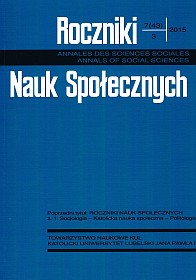Electoral manipulations
Abstract
Electoral manipulations are a mechanism of exerting permanent influence on the election result. The subjects of electoral competition want to influence their electoral opportunities. Possible dimensions of manipulations are related to the potential subjects that carry them out. The ruling ones have a higher manipulation potential than the political opposition. Electoral manipulations modify the level of political uncertainty. Its dimension is shaped in the institutional and communication spheres. The effects of electoral manipulations are more often aimed at the nearest future only, but those in the institutional sphere may shape the long-term level of political uncertainty.
References
Antoszewski A., Partie i systemy partyjne państw Unii Europejskiej na przełomie wieków, Toruń: Wydawnictwo Adam Marszałek 2009.
Banducci S.A., Karp J.A., Political Efficacy and Participation in Twenty-Seven Democracies: How Electoral Systems Shape Political Behaviour, „British Journal of Political Science” 38, 2008.
Colomer J.M., The Strategy and History of Electoral System Choice, [in:] J.M. Colomer (ed.), Handbook of Electoral System Choice, Basingstoke: Palgrave-Macmillan 2004.
Cześnik M., Partycypacja wyborcza w Polsce. Perspektywa porównawcza, Warszawa: Wydawnictwo Naukowe Scholar 2007.
Fowler J.H., Smirnov O., Mandates, Parties, and Voters: how Elections Shape the Future, Philadelphia: Temple University Press 2007.
Glajcar R., System wyborczy do Parlamentu Europejskiego w Polsce, [in:] R. Glajcar, W. Wojtasik (eds.), Wybory do Parlamentu Europejskiego w Polsce 2009, Katowice: Wydawnictwo Remar 2010.
Haman J., Demokracja. Decyzje. Wybory. Warszawa: Wydawnictwo Naukowe Scholar 2003.
Lijphart A., Electoral Systems and Party Systems: A Study of Twenty-Seven Democracies 1945-1990, New York: Oxford University Press 1994.
Lijphart A., Patterns of Democracy: Government Forms and Performance in Thirty-Six Countries, New Haven and London: Yale University Press 1999.
Lindberg S.I., The Power of Elections Revisited, Paper presented at the conference, Elections and Political Identities in New Democracies, Yale University, April 28-29, 2007, 2007.
Lipset S.M., Rokkan S., Osie podziałów, systemy partyjne oraz afiliacje wyborców, [in:] J. Szczupaczyński (ed.), Elity, demokracja, wybory, Warszawa: Wydawnictwo Naukowe Scholar 1993.
Norris P., Choosing Electoral Systems: Proportional, Majoritarian, and Mixed Systems, „Inter- national Political Science Review” 18(3), 1997.
Palfrey T.R., Rosenthal H., Voter Participation and Strategic Uncertainty, „American Political Science Review” Vol. 79, 1985.
Przeworski A., Some problems in the study of the transition to democracy, [in:] G. O’Donnell, P. Schmitter, L. Whitehead (eds.), Transitions from authoritarian rule: Prospects for democracy, Baltimore: Johns Hopkins University Press 1986.
Rea D.W., The Political Consequences of Electoral Laws, New Haven: Yale University Press 1969.
Schedler A., Elections Without Democracy: The Menu of Manipulation, „Journal of Democracy” Vol. 13, No. 2, 2002.
Schedler A., The Politics of Uncertainty: Sustaining and Subverting Electoral Authoritarianism, Oxford University Press 2013.
Simpser A., Why governments and parties manipulate elections: theory, practice, and implications, Cambridge: Cambridge University Press 2013.
Sokół W., Geneza i ewolucja systemów wyborczych w państwach Europy Środkowej i Wschodniej, Lublin: Wydawnictwo Uniwersytetu Marii Curie-Skłodowskiej 2007.
Taagepera R., Shugart M.S., Seats and Votes: The Effects and Determinants of Electoral Systems, New Heaven: Yale University Press 1989.
Tingsten H., The problem of democracy, New York: Bedminster Press 1989.
Turska-Kawa A., Percepcja istotności wyborów samorządowych a partycypacja polityczna, [in:] M. Barański, A. Czyż, S. Kubas (eds.), Rola samorządu terytorialnego w modernizacji Polski, Katowice: Wydawnictwo Śląsk 2010.
Turska-Kawa A., Specyfika motywacji w aktywności politycznej, [in:] J. Golinowski, F. Pierzchalski (eds.), Osobliwości polskiej demokracji w XXI wieku. Uwarunkowania kulturowo- medialne, Bydgoszcz: Wydawnictwo Uniwersytetu Kazimierza Wielkiego 2011.
Turska-Kawa A., Wojtasik W., Postawy, zachowania i decyzje wyborcze jak przedmiot badań empirycznych, „Preferencje Polityczne” Vol. 1, 2010.
Turska-Kawa A., Wojtasik W., Communication Function of Elections, „Communication Today” 1, 2013.
Westholm A., Distance versus Direction: The Illusory Defeat of the Proximity Theory of Electoral Choice, “American Political Science Review” 91(4), 1997.
Wojtasik W., Podstawowe wymiary manipulacji wyborczych, [in:] J. Podgórska-Rykała, K. Stelmach, M. Marmola (eds.), Vademecum Śląsk, Vol. 2, Katowice: Towarzystwo Inicjatyw Naukowych 2014.
Żukowski A., Gerrymandering – manipulacja granicami okręgów wyborczych w systemach demokratycznych, [in:] M. Kowalski (ed.), Przestrzeń wyborcza Polski, Warszawa: PAN IGiPZ 2003.
Copyright (c) 2015 Roczniki Nauk Społecznych

This work is licensed under a Creative Commons Attribution-NonCommercial-NoDerivatives 4.0 International License.


